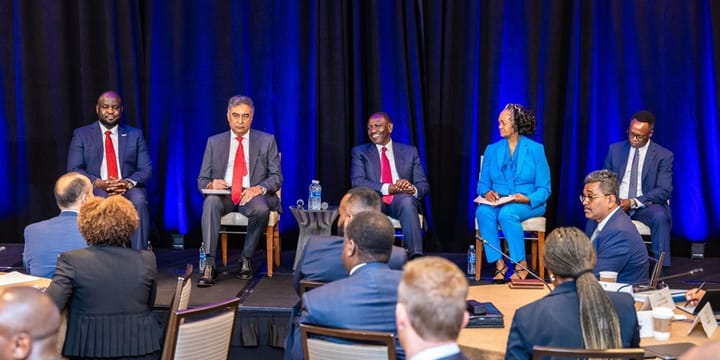On NDIC's disbursement of ₦650 bn to 2.3 million insured Heritage Bank depositors

The Nigeria Deposit Insurance Corporation (NDIC) has begun paying out the trapped funds of depositors at the now-defunct Heritage Bank.
On June 3, 2024, the Central Bank of Nigeria revoked the banking licence of Heritage Bank PLC (Heritage Bank) for contravening Section 12 (1) of the BOFIA 2020 constituting a threat to financial stability. As mandated by the following section, 12(2) of BOFIA, 2020, the Nigeria Deposit Insurance Corporation (NDIC) assumed the role of liquidator to mitigate risks for depositors and the broader financial system.
The NDIC immediately swung into action and commenced the liquidation process. "In accordance with Section 55 sub-section 1 & 2 of the NDIC Act 2023, the Corporation has commenced liquidation process of the failed bank with immediate verification and payment of insured deposits to the bank depositors," the Insurance corporation said in a statement released on the revocation announcement day.
Recall, following the 18th meeting of the NDIC in April, the Interim Management Committee (IMC) of the Corporation approved an upward review of the maximum deposit insurance coverage of DMBs from ₦500,000 (in 2016) to ₦5 million to the benefit of bank depositors.
At the time of the increase, MD/CEO of NDIC, Mr Bello Hassan, "explained that the new coverage for DMBs now covers 98.98% of total depositors". However, that ratio is even higher in Heritage Bank's case, where 99.9% of depositors had balances below the ₦5 million mark which could indicate that fewer depositors trusted the now-defunct bank with a significant chunk of their money. Only 4,000 depositors had more than ₦5 million in their account, according to Mr Hassan as cited by ThisDay, a local newspaper present at the meeting in Abuja.
Also, note that insurance in a licensed deposit-taking institution is per depositor (an entity) not per account. So, if you have multiple accounts in one bank, your insurance is on the combined total of funds in that bank not on each account. There are exceptions in the case of a depositor having a joint account and/or a business account at the same bank. But please acquaint yourself with the NDIC's terms.
That said, here is how the NDIC is going about the return of funds to depositors.
First, using the unique Bank Verification Number which ties multiple bank accounts to a depositor, it will pay out trapped funds to alternate accounts up to the insured amount. On average, banked Nigerians have more than two active accounts, so this approach of paying to alternate accounts should suffice for most depositors. However, it's unclear how the NDIC will choose which bank account to pay to, in the case where a customer has three or more bank accounts linked to their BVN.
So far, this process seems to have worked smoothly to the delight of many Nigerians. "...I just got a credit alert into one of my accounts from NDIC for my balance at Heritage Bank. No noise, no documentation/verification hassles...", says X user, @toyinabdulrazaq. Similarly, LinkedIn user, Adedeji Olowe reports receiving his trapped Heritage Bank funds. “I cried when I lost my hard-earned N10,000 to the Heritage Bank Plc debacle. But somehow, Nigeria Deposit Insurance Corporation found my other bank account and paid me”.
I just got a credit alert into one of my accounts from NDIC for my balance at Heritage Bank. No noise, no documentation/verification hassles — Toyin Abdulrazaq
While depositors with more than the insured amount will "be paid liquidation dividend upon realization of the bank's assets and recovery of debts owed to the bank" which the NDIC CEO had vowed to recover. Heritage Bank had an active loan portfolio of about ₦700 billion, with nearly all of them deemed to be lost or doubtful, as of the first quarter of this year. A question for Insurance bankers in the house, will the depositors with more than ₦5 million be paid the ₦5 million cap with the excess recoverable upon liquidation of assets? If yes, great. If no, why?
Second, for depositors without an alternate bank account, you are advised to file a claim with details contained on the NDIC claims webpage. Or visit the nearest branch of Heritage Bank with proof of account ownership like a bank statement, a verifiable means of identification like National ID card, their Bank Verification Number (BVN) and an account to receive the money.
Deposit insurance is something that's not often understood even in developed markets like the US (see the Synapse, Evolve Bank & Trust case). But NDIC's prompt action through multistakeholder collaboration and clear communication has earned them praise from banked Nigerians. As for Heritage bank, their licence revocation might not have come as a shock to analysts and insiders but to the regular observer, it must has been a shock as they were not part of the three banks whose management team was dissolved by the CBN in January 2024.
Finally, please note that the fact that those bank's management were dissolved doesn't mean that the CBN has revoked their licence. We know that the CBN has revoked a regulated entity's licence when the announcement comes directly from them; through their official channel like their verified X account (cenbank) or the CBN's secure website (https://www.cbn.gov.ng/).






